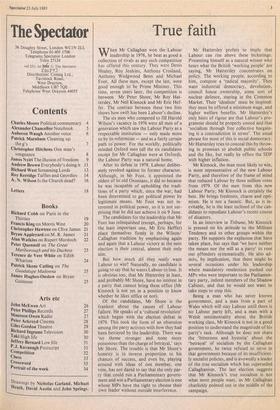True faith
When Mr Callaghan won the Labour leadership in 1976, he beat as good a collection of rivals as any such competition has offered this century. They were Denis Healey, Roy Jenkins, Anthony Crosland, Anthony Wedgwood Benn and Michael Foot. All these men, except the last, were good enough to be Prime Minister. This time, seven years later, the competition is between Mr Peter Shore, Mr Roy Hat- tersley, Mr Neil Kinnock and Mr Eric Hef- fer. The contrast between these two lists shows how swift has been Labour's decline.
The six men who competed to fill Harold Wilson's vacancy in 1976 were all men of a generation which saw the Labour Party as a respectable institution — only made more so by its reformism — and as a fairly certain path toapower. For the worldly, politically minded Oxford men (all the six candidates except for Mr Callaghan were at Oxford), the Labour Party was a natural home.
After its defeat in 1979, Labour deliber- ately revolted against its former character. Although, in Mr Foot, it appointed the oldest of its old Oxonians, it did so because he was incapable of upholding the tradi- tions of a party which, since the war, had been determined to get political power by legitimate means. Mr Foot was not in- terested in political power, so it is not sur- prising that he did not achieve it on 9 June.
The candidates for the leadership that Mr Foot has relinquished (except, perhaps, for the least important one, Mr Eric Heffer) place themselves firmly in the Wilson/ Callaghan tradition by emphasising again and again that a Labour victory at the next election is their central, almost their only aim.
But how much do they really want Labour to win? Naturally, no candidate is going to say that he wants Labour to lose. It is obvious too, that Mr Hattersley at least, and probably Mr Shore, have no interest in a party that cannot bring them office (Mr Kinnock is not yet in a position to know whether he likes office or not).
Of the candidates, Mr Shore is the frankest about the causes of Labour failure. He speaks of a 'cultural revolution' which began with the election defeat in 1979. This took the form of an obsession among the party activists with how they had been betrayed by the leadership. There was 'no theme stronger and none more poisonous than the charge of betrayal,' says Mr Shore. The trouble is that Mr Shore's honesty is in inverse proportion to his chances of success, and even he, playing around with ideas of one member, one vote, has not dared to say that the only par- ty that could run a Parliamentary govern- ment and win a Parliamentary election is one whose MPs have the right to choose their own leader without outside interference. Mt Hattersley prefers to imply that Labour can rise above these bickerings. Presenting himself as a natural winner who hears what the British 'working people' are saying, Mr Hattersley concentrates on policy. The working people, according to him, compose a 'radical majority'. They want industrial democracy, devolution, council house . ownership, some sort of nuclear defence, staying in the Common Market. Their 'idealism' must be inspired: they must be offered a minimum wage, and higher welfare benefits. Mr Hattersley's only hints of rigour are that Labour's pro- gramme should be properly costed and that 'socialism through free collective bargain- ing is a contradiction in terms'. The usual phrase for most of this is social democracy. Mr Hattersley tries to conceal this by throw- ing in promises to abolish public schools and the like, but really he offers the SDP with higher inflation.
Mr Kinnock, the man most likely to win, is most representative of the new Labour Party, and therefore of the frame of mind that reduced Labour by three million votes from 1979. Of the men from this new Labour Party, Mr Kinnock is certainly the best. He brings freshness, charm and opti- mism. He is not a fanatic. But, as is in- evitable, he is the least inclined of the can- didates to repudiate Labour's recent course of disasters.
In an interview in Tribune, Mr Kinnock is pressed on his attitude to the Militant Tendency and to other groups within the party. He supports the explusion that have taken place, but says that 'we have neither the means nor the will as a party' to root out Offenders systematically. He also ad- mits, by implication, that there might be several occasions under his leadership where mandatory reselection pushed out MPs who were important to the Parliamen- tary party, indeed members of the Shadow Cabinet, and that he would not want to take steps to stop this.
Being a man who has never known government, and a man from a part of Wales which will stay Labour until there is no Labour party left, and a man with a Welsh sentimentality about the British working class, Mr Kinnock is not in a good position to understand the magnitude of his party's task. Although he does not share the 'bitterness and hysteria' about the `betrayal' of socialism by the Callaghan government, he twice refused to serve in that government because of its insufficient- ly socialist policies, and is avowedly a leader of the true socialism which has superseded Callaghanism. The last election suggests that Mr Kinnock's true socialism is not what most people want, as Mr Callaghan churlishly pointed out in the middle of the campaign.






































 Previous page
Previous page